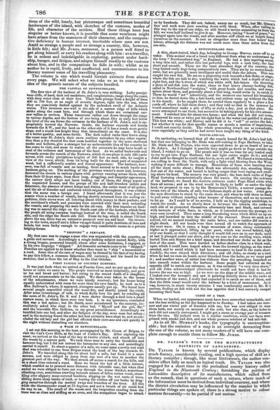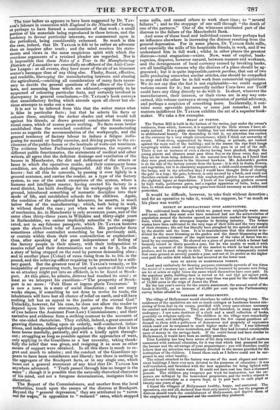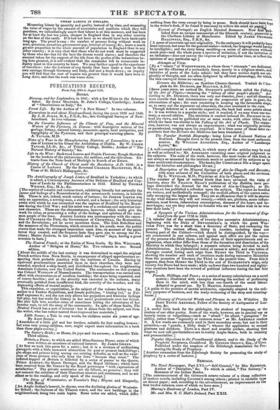DR. TAYLOR'S TOUR IN THE MANUFACTURING DISTRICTS OF LANCASHIRE.
Da. TAYLOR IS known by several publications, which display much fluency, considerable reading, and a high species of skill as a literary compiler ; though, like most litterateurs, the author con- siders effect fully as much as logical truth. Dr. TAYLOR was also engaged for a short time in the periodical county history called England in the Nineteenth Century ; furnishing the portion of Lancashire descriptive of its manufactures, which called from us the remark, that in questions of such a nature, where much of the information must be derived from individual courtesy, and where the district circulation may be influenced by the manner in which particular things are spoken of, there is a strong motive to colour matters favourably—to be partial if not untrue. • The tour before us appears to have been suggested by Dr. TAY- LOR'S labours in connexion with England in the Nineteenth Century, or perhaps to have formed a continuation of that work ; a small portion of his materials being reproduced in these letters, and the tendency to favour particular interests, we commented upon in the periodical, being considerably enhanced. So much is this the case, indeed, that Dr. TAYLOR is felt to be rather an advocate than an inquirer after truth ; and the mind receives his state- ments and views in the same suspicious spirit with which the overdone arguments of a retained pleader are regarded. Nor is it impossible that these Notes of a Tour in the Manufacturing Districts of Lancashire are essentially an offshoot of the Anti-Corn- law League : at all events, they have more of the air of an itinerant orator's harangue than of any thing else. Flashy, fluent, effective, and readable, blarneying the manufacturing interests and abusing the agricultural,—omitting all consideration of many facts neces- sary to decide the general questions of the effects of the Corn- laws, and assuming those which are adduced,—apparently to be suspected of colouring particular facts, and certainly involved in discrepancy in general conclusions,—Dr. TAYLOR'S book conveys that unsatisfactory feeling which attends upon all clever but ob- vious attempts to make out a case.
It is not to be inferred from this that the writer states what is false in particular facts ; but that he selects his facts or colours them, omitting the darker shades and what would tell against his friends, or draws general conclusions from excep- tional cases, which of course prove nothing. No facts seem better established than the wretched condition of the manufacturing towns as regards the accommodation of the workpeople, and the general tendency of factory labour to induce a fatigue indis- posing for mental or bodily exercise, and driving people to the ex- citement of the public-house or the lassitude of worn-out weariness. The evidence before Parliamentary Committees, the reports of different public functionaries, the statements of medical and other writers, all agree that the deficient drainage and ventilation of the houses in Manchester, the dirt and defilement of the streets or lanes in which the operatives reside, and their consequent home condition, are deplorable and disgraceful. All this Dr. TAYLOR knows : but all this he conceals, by passing it over lightly in a general sentence, and carries the reader, as a type of the factory system, to one of the crack exceptions of the system, where a humane and intelligent master, having erected his factory in a rural district, has built dwellings for his workpeople on his own ground, introduced something of monastic discipline into their mode of life, and established schools for the children. Again, the condition of the agricultural labourers, be asserts, is much below that of the manufacturing : which, both being in work, is without doubt the case ; yet when we see the average life of mechanics, &c. in Manchester is only seventeen years, and of the same class thirty-three years in Wiltshire and thirty-eight years in Rutlandshire, we cannot implicitly subscribe to the exagge- rated, not to say fulsome panegyric, which Dr. TAYLOR bestows upon the short-lived tribe of Lancashire. His particular facts sometimes either contradict something he has previously said, or contain within them their own contradiction or explanation : thus, after speaking of the great independence of feeling of the factory people in their misery, with their indisposition to receive relief and their determination not to ask for it, he tells a story of being stopped on the road by persons demanding alms ; and in another place (Come) of rates rising from 3s. to 10s. in the pound, and the relieving-officer requiring to be protected by a mili- tary guard. But the greatest test of Dr. TAYLOR'S veracity, or his incapability of presenting truth, beyond such matter-of-fact truths as an attorney might put into an affidavit, is to be found at Stock- port. At this place, he admits, distress had reached its acme ; at least so we interpret his exordium—" The prosperity of Stock- port is no more : ' Fuit Ilium et ingens gloria Teucrorum.' It is now a town in a state of social dissolution ; and ere many weeks elapse, if something be not done to revive its trade, the inhabitants will have lost all chance of relief on earth, and will have nothing left but an appeal to the justice of the eternal God." Unluckily, however, for his case, he does not allow the reader to depend upon his own statements, but quotes from the Report of (we believe the Assistant Poor-Law) Commissioners ; and their narrative and evidence form a striking contrast to the accounts of the one-sided rhetorician. They exhibit, indeed, a great amount of gnawing distress, falling upon an orderly, well-conducted, indus- tnous, and independent-spirited population : they show that it has been borne manfully, patiently, and with a kindly spirit through- out ; struggling as long as possible against the approaches of want, only applying to the Guardians as a last necessity, taking thank- fully the relief that was given, and resigning it as soon as other means of support were obtained. In all this there is much to re- gret and much to admire ; and the conduct of the Guardians ap- pears to have been considerate and liberal ; but there is nothing in the aggregate of the Stockport facts, or in any single one, which bears out a general statement of any kind that Dr. TAYLOR has anywhere advanced. "Truth passed through him no longer is the same" ; though it is possible that the naturally rhetorical character of his mind, and not a foregone determination, instigates him to distortion.
The Report of the Commissioners, and another from the local authorities, touch upon the causes of the distress at Stockport. Beyond the "general depression," they are attributed to " turns- out for wages," in opposition to " reduced " rates, which stopped some mills, and caused others to work short time; to " several failures " ; and to the stoppage of one mill through " the death of one of the partners." One of the witnesses attributed part of the distress to the failure of the Macclesfield Bank.
And some of these local and individual causes have perhaps had an influence elsewhere in increasing the distress resulting from the general depression. For in some places, Dr. TAYLOR finds mills, and especially the mills of his hospitable friends, in work, and if we understand him in full work ; whilst in other places the greatest distress—total stagnation—exists. Now, want of capital, bank- ruptcies, disputes, however natural, between masters and workmen, and the derangement of local currency caused by breaking banks, are all intelligible reasons why the distress of a place should be ag- gravated ; but it is quite impossible,cateris paribus, that out of two mills producing somewhat similar articles, one should be compelled to stop and the other be in full work from commercial regulations. We do not say that the fact is not explainable—we could suggest various causes for it ; but assuredly neither Corn-laws nor Tariff could have any thing directly to do with it. In short, wherever the manufacturers, their interest, or their views are in any way con- cerned, this volume conveys a strong impression of partial advocacy, and perhaps a suspicion of something more. Incidentally, it con- tains some agreeable pictures, or some just remarks ; and in matters indifferent Dr. TAYLOR exhibits the art of a superior book- maker. We take a few examples.
FRUIT AT TURTON.
The Turton Mill is built in the bottom of the ravine, just under the owner's residence, from which, however, it is separated by the little stream I have al- ready noticed. It is a plain stone building, but not without some pretensions to architectural beauty. On descending to visit it, my attention was excited at the entrance by a very simple circumstance, which I think not unworthy of record. Fruit-trees, unprotected by fence, railing, or palisade, are trained against the main wall of the building; and in the season the ripe fruit hangs temptingly within reach of every operative who goes in or out of the mill. There is not an instance of even a cherry having been plucked, though the young piecers and cleaners must pass them five or six tunes every day, and they are far from being deficient in the natural love for fruit, as I found that they were good customers to the itinerant hawkers. Mr. Ashworth's garden is on the side of the factory remote from the house: it is rich in fruits, flowers, and vegetables, but it is absolutely unprotected; a child could scramble through the hedge, and in my schoolboy days I would have thought little of clearing the gate in a leap; the gate, however, is only secured by a latch, and could not therefore exclude an infant. Now this unprotected garden has never suffered the slightest injury or depredation. I know of less tempting gardens secured by high walls, ponderous gates, and a regular apparatus ot bolts, locks, and bars, to which man-traps and spring-guns were found necessary as an additional protection.
It would be difficult, however, to take fruit without detection ; and for an operative to take it, would, we suppose, be "as much as his place was worth."
EFFECT OF MANUFACTURES UPON AGRICULTURE.
The cultivated lands through which we passed were originally waste moor and moss; such they must ever have remained had not the accumulation of population around the factories opened an immediate market for farming pro- duce, which gave the strongest impulse to farming industry. The former wastes have been cultivated to the very tops of their hills and the very margin of their streams ; the soil has literally been ploughed by the spindle and sowed by the shuttle and the loom. It is to manufactures that this district is in- debted for the moor blooming as the garden and the desert blossoming as the rose. A curious instance of the rapid increase of the value of farms was re- lated by my companion. He showed me a piece of ground which a farmer had formerly rented at thirty pounds a year, but he was unable to work it with profit, on account of the distance of the market to which he had to send his produce, and he sank deeply in debt. That same farmer subsequently rented that same ground at seventy pounds a year, and out of its profits at the higher rent paid the entire debt which he had incurred at the lower rent.
RISE OF RENTS IN ROSENDALE FOREST.
Land used exclusively for farming purposes commands upwards of ten times the rental of a century ago ; and farms formerly tenanted by persons now living are let at seven or eight times the sums which themselves have once paid. In the populous parts, building-land is rented at 6f/. and 6hd. per square yard, being 121/. to 131/. per acre, or a larger sum than was paid for the whole forest of 15,300 acres in the reign of James the First. By the last year's survey for the county assessment, the annual rental of the forest is 50,0351., or an increase of 41,000 per cent upon the Parliamentary survey before alluded to.
PARADISE OF HOLLYMOUNT.
The village of Hollymount would elsewhere be called a thriving town. The residences of the operatives are not so much cottages as handsome houses con- sisting of from four to six rooms, provided with every convenience nee for comfort and cleanliness. They are all well furnished, in many cu:ssjiTtK mahogany ; I saw none destitute of a clock and a small collection of books, generally on religious subjects. The children in the village were remarkably healthy, neat, and intelligent. They answered the few casual questions ad- dressed to them with a politeness of demeanour and propriety of expression which could not be surpassed in much higher ranks of life. I was informed that most of the men were teetotallers, and that they had invested considerable sums of money in the savings-bank. If the entire forest had been similar to Hollymount, it would have been an earthly paradise. Your Lordship has long been aware of the deep interest I feel in all matters connected with national education, for it was that which first procured for me the honour and the advantage of your acquaintance: you will therefore readily believe that my attention was anxiously directed to the means provided for the instruction of the children. I found them such as I believe could not be sur- passed in any other locality. The school attached to the factory was one of the most elegant and conve- nient buildings I have ever seen devoted to the purposes of education : it was well ventilated, and furnished with the best apparatus for being lighted with gas and heated with warm water. It could not have cost less than a thousand pounds. The children pay twopence per week for instruction, but the ex- penses are defrayed by the benevolent proprietors, and the weekly stipend is allowed to accumulate as a reserve fund, to be paid back to each pupil at
twenty-one years of age. • •
I found the villagers of Hollymount healthy, happy, and contented. The operatives, one and all, declared that their only anxiety was, lest the progress of distress should reach the establishment of Hollymount, and deprive them of the employment they possessed and the comforts they produced.
CHEAP LABOUR IN ENGLAND.
Measuring labour by quantity and quality instead of by time, and measuring the value of wages by the amount of necessaries and comforts which they will purchase, we unhesitatingly assert that labour is at this moment, and has been for at least the last ten years, cheaper in England than in any other country on the face of the earth. If it had not been so we should have been bankrupts long ago. The proof is easy : the number of persons living without work on rent, pensions, annuities, government pay, interest of money, &e., bears a much greater proportion to the whole amount of population in England than in any other country : it is very clear that those who do not work must be supported by those who do—but for the bees the drones would starve ; and therefore the amount taken for the support of the idle from the profits of the industrious be- ing here greatest, it is self-evident that the remainder left to remunerate in- dustry must in this country be least. We may further appeal to the experience of travellers : take the instance of any family that have made a tour in their own carriage through Germany and Italy, and met a break-down ; on inquiry you will find that the cost of repairs was greater than it would have been in Long Acre, and that the work was worse done.




























 Previous page
Previous page